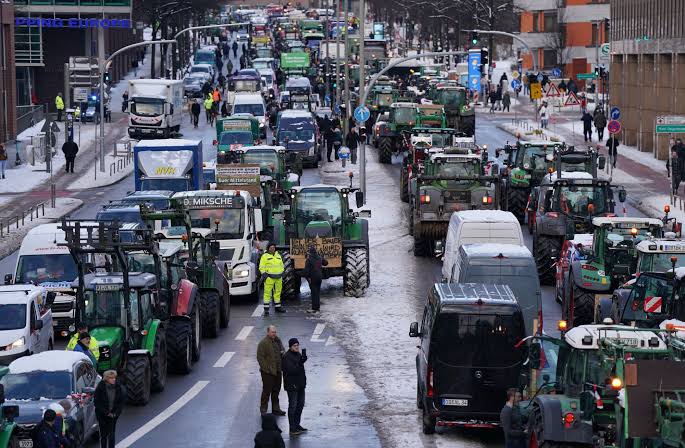Economic struggles plague german family farms, prompting widespread protests

The Bernhardt family, custodians of a dairy farm in Saxony, Eastern Germany, spanning over a century, faces mounting challenges in passing their agricultural legacy to the next generation.
Marc Bernhardt, a 37-year-old farmer based in Freital, south of Dresden, highlights a 40% increase in production costs since the onset of the war in Ukraine and a 50% surge in electricity expenses, signaling potential shifts in the family’s farming trajectory.
Amidst a backdrop of rising food prices, the struggle intensifies for family farms, constituting half of Germany’s agricultural sector. Recent government decisions, particularly unexpected cuts to agricultural subsidies, have sparked widespread discontent. Last week, tractor blockades reverberated across the nation, culminating in a major demonstration in Berlin on Monday, where thousands of farmers voiced their concerns.
At the heart of this discontent is the anticipated loss of subsidies, estimated at “10 to 15 percent” by Bernhardt, a sentiment echoed by many farmers. Public aid constitutes over half of agricultural incomes in Germany, making the planned reductions perceived as an unjust burden. The government, grappling with budget constraints, justifies the cuts, pointing to increased farm incomes; however, critics argue that these figures are an average, not reflective of the challenges faced by smaller farms.
The financial challenges for family farms extend beyond subsidy cuts. Factors such as costly investments for environmental compliance, difficulty in finding skilled workers, and succession planning compound the struggles. A DZ Bank study highlights the growing international competition, which, coupled with these challenges, leads some farmers to question the viability of maintaining smaller operations.
As Germany experiences a 12% decline in the number of farms from 2010 to 2020, a further drop to 100,000 by 2040 is anticipated, accompanied by consolidation in the agricultural sector. Family farms, facing an uncertain future, explore diversification avenues.
For instance, Marc Bernhardt plans to open a guest house, host educational events, and install solar panels to supplement income. Nevertheless, the specter of declining family farms looms large, prompting a broader conversation about the sustainability of traditional agricultural practices in a changing economic landscape.












